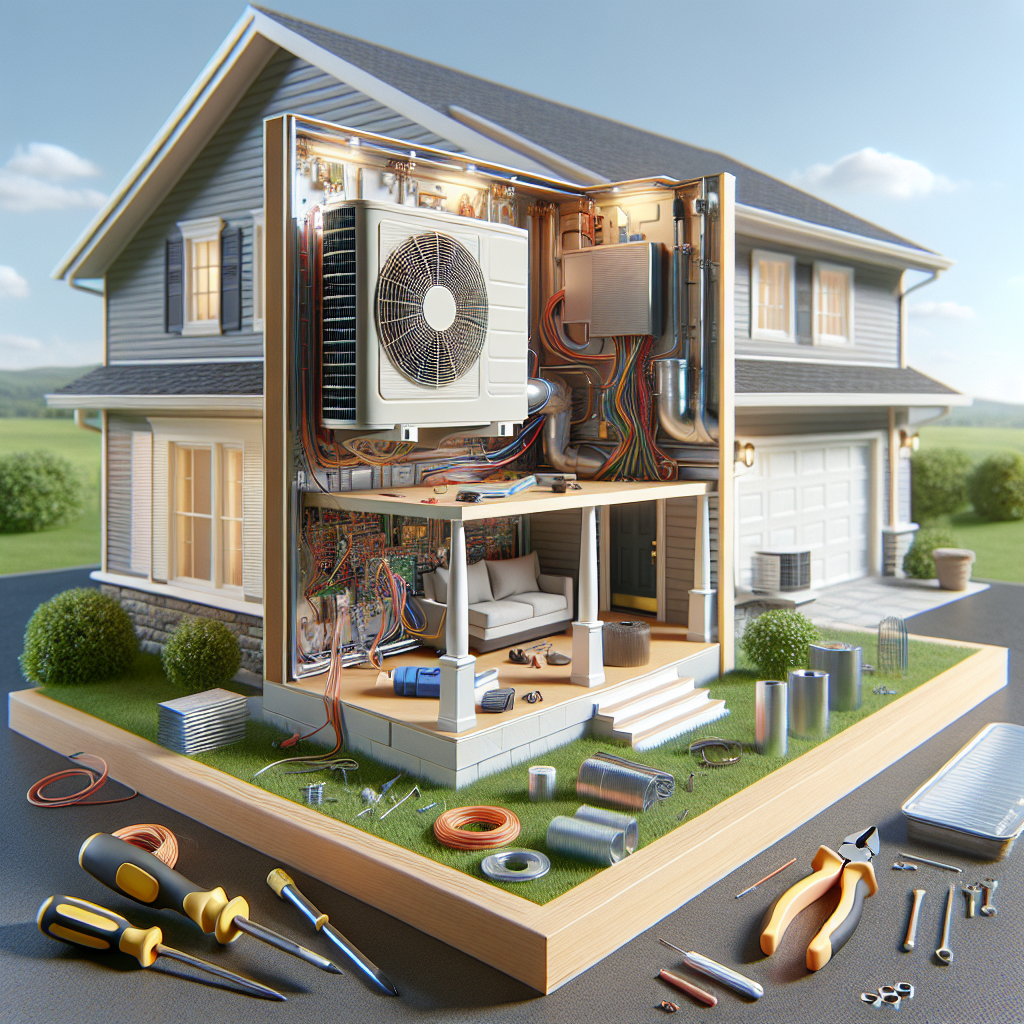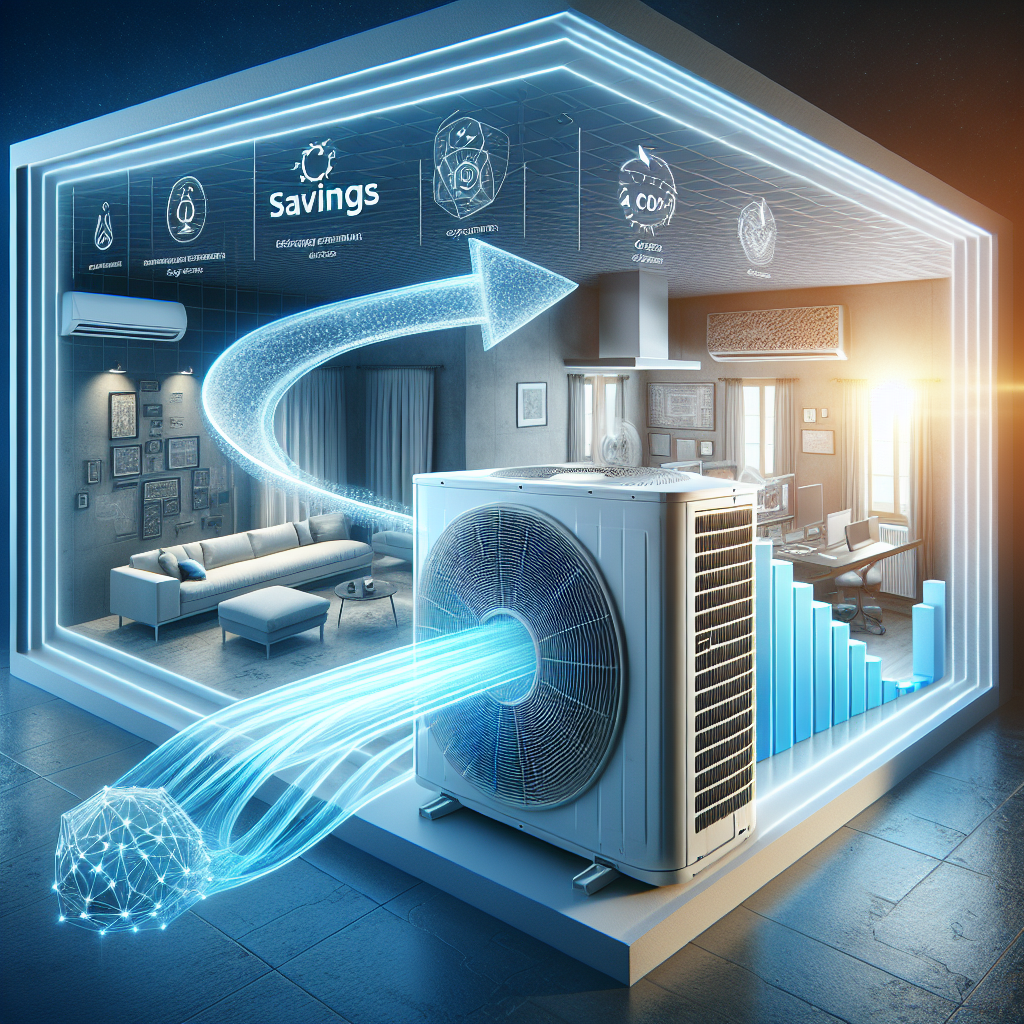If you’re considering upgrading your home with a fresh air conditioning system, you’re definitely making a smart move!.
The installation cost for a new air conditioning system can range quite a bit, typically falling between $3,000 and $7,This price usually covers the system itself, installation labor, and necessary materials.
But it’s worth noting that several factors can affect this HVAC system price.
Expenses such as permits, electrical work, and potential adjustments to existing ductwork can add up. The labor rates in your area and the size of your home will significantly impact the overall installation cost of a new AC unit, affecting the price of your HVAC system.
Click here to learn more about: prices.html
Factors Affecting Installation Cost
As you think more about the costs we discussed earlier, it’s clear that understanding what drives those prices can be super helpful. There are several elements that can shape your budget for a new air conditioning system installation, so let’s explore the key considerations that will influence your HVAC installation estimate.
Type of AC Unit
- Unit Selection:
- Different air conditioning brands offer a variety of systems, which come at a range of price points. Whether you’re interested in a central air conditioning system, a sleek ductless mini-split, or a modern smart unit, your choice will directly affect your overall costs. Additionally, some units are designed with energy efficient cooling in mind, which might mean higher upfront costs but can lead to greater seasonal savings over time.
Complexity of Installation
- Installation Layout:
- The layout of your home plays a significant role. A straightforward installation is typically more affordable than a complicated setup that requires extensive ductwork installation or modifications to fit existing systems. If adjustments are needed, such as dealing with oversized AC issues or integrating new system features, be ready for possible increases in contractor fees.
Necessary Modifications
- Project Changes:
- If your new AC unit requires extensive changes to your ductwork or significant electrical modifications, these can affect your total installation cost. It’s also wise to consider any potential refrigerant requirements and the removal of old units, as these tasks can add to your overall project scope and influence your HVAC system price.

How To Choose A New AC Unit
Now that we’ve looked at what can influence the costs of a new AC unit, let’s focus on selecting the right one for your home. First things first, take a look at your living space.
Is your home open and airy, or do you have those cozy corners that always feel a bit warmer? These details will play a big role in your decision.
Next, think about what you’re willing to spend.
While it’s easy to lean towards the cheapest option, keep in mind that putting a little more money into a quality unit now can save you on repairs down the road.
Energy efficiency is another biggie that you shouldn’t ignore since it can affect your savings later. Be sure to check out the SEER ratings; generally, a higher number means better efficiency and lower utility bills down the line! Also, keep an eye on the unit’s cooling capacity—if it’s too small, your home won’t stay comfortable; if it’s oversized, you might face higher contractor fees, increased labor costs, or even inefficient ductwork installation.
Choosing Air Conditioning
- Correctly sized air conditioners boost efficiency and comfort, leading to lower energy bills.
- Choosing higher SEER-rated units can provide significant utility savings over time.
- Oversized or undersized units can raise maintenance costs and create uneven cooling.
- Assessing your home’s layout is key to finding the best air conditioning solution for optimal performance.
Understanding Average Installation Price
Now that we’ve explored how to choose the right AC unit for your home, let’s talk about understanding the average installation price. This insight can really help homeowners in Houston make smart choices that fit their budget.
Installation costs can differ quite a bit based on the type of unit you select, whether it’s a standard model or one with advanced energy efficient cooling features. While high-efficiency options may require a higher upfront cost, they often provide significant savings on your home cooling systems over time.
It’s key to think about several factors when figuring out the total cost. The size and type of the unit, along with how complex the installation is, are important. For example, central air conditioning systems might need more extensive ductwork installation, which can raise your overall HVAC installation estimate. Plus, local market factors, such as contractor fees and labor costs, have a big impact on how much you’ll end up spending.
Gathering this information beforehand can help you navigate the HVAC system price landscape more easily. Whether you’re comparing different air conditioning brands or exploring financing options, being informed about installation quotes can really enhance your homeowner investment choices.
What Are Contractor Fees
Understanding the different costs that come with hiring professionals can make a big difference in how you manage your home projects. Once you’ve figured out how to choose a new AC unit and what factors influence installation pricing, let’s dig into the contractor fees you might run into.
Labor costs usually take up a large part of your total bill. When you’re looking at air conditioning installation, these expenses can change depending on how complex the job is and the experience of the technician doing the work.
Getting a good grasp of average labor fees can keep you on budget and help you dodge any surprise expenses later on. And don’t forget about service charges because these can add to your costs.
Service charges often come into play for consultations or technician visits, especially if it’s not during regular hours. If something goes wrong, that’s when those costs can pile up, affecting your total HVAC installation estimate.
Also, be aware of permits and inspections. These fees are important for making sure your project meets local regulations, and they can also influence your total installation cost. Taking these steps can set you up for seasonal savings while working with local HVAC contractors on financing options.
Key Considerations for Hiring Professionals
- Labor costs usually represent a big chunk of the total project expenses.
- Installation prices for HVAC jobs can vary based on the complexity and technician experience.
- Service charges may be added for consultations, particularly during after-hours or emergencies.
- Permits and inspections are essential for meeting local rules, which can affect overall costs.
Exploring Energy Efficient Cooling Options
After considering contractor fees and installation costs, it’s time to look at energy efficient cooling options that suit Houston’s sizzling climate. With some serious heat to handle, a budget-friendly cooling system can make all the difference in creating a comfortable home and keeping those utility bills in check.
Living in this humid environment, tackling your cooling needs specifically is crucial. A standard unit often falls short when facing the intense summer heat, so focusing on unit efficiency can turn your home into a cool sanctuary.
Choosing the right energy-smart systems not only keeps you comfortable but can also bring significant utility savings during those sweltering months. Let’s dive into the two primary types of systems that can help you beat the heat.
Central Air Conditioning Systems are a popular choice, with the latest models having enhanced energy efficiency and innovative technologies. Their design plays a vital role in determining how well they perform in keeping your home cool while meeting the increasing demands of the Houston heat.
These modern systems often come with features like variable-speed compressors and smart thermostats that allow for better temperature control and reduced energy consumption. Additionally, ensuring that your system’s cooling capacity aligns with your home’s needs can prevent oversized AC issues down the line, leading to improved system longevity and performance.
Don’t forget to check out energy star ratings and available tax credits for purchasing energy-efficient models. These incentives can help offset any upfront costs associated with installation, making it easier to invest in a new AC unit. Ultimately, understanding the various models and their efficiencies can lead to smart decisions that not only enhance your indoor air quality but also strengthen your overall homeowner investment.
Evaluating HVAC Installation Estimates
Now that you’ve got a handle on contractor fees and energy-efficient options, let’s shift gears to evaluating those HVAC installation estimates you’re receiving. It can be a bit overwhelming at first, but breaking down what’s included in each estimate helps ensure you’re making an informed choice for your home.
Pay special attention to the finer details in the quotes, like warranties and ongoing service plans. Assessing these factors gives you a clearer picture of the long-term value beyond just the upfront costs.
Having a solid installation checklist handy is a game changer, letting you pinpoint which system specifications matter most to you. When evaluating the estimates, focus on a clear breakdown of labor and equipment costs. This approach allows you to understand exactly where your money goes.
Also, it’s crucial to clarify whether the removal of old units is included in the estimates because that can significantly affect your overall HVAC system price. Don’t hesitate to dig into the details regarding the installation checklist, removal of old units, system specifications, and maintenance plans. These elements can shape your experience with your new AC unit, ensuring that you balance quality with affordability.
HVAC Installation Quotes
- Detailed estimates help in understanding the cost distribution between labor and equipment.
- Including the removal of old units in the quote can prevent unexpected expenses.
- Warranties and service plans can add significant long-term value beyond initial costs.
- A comprehensive installation checklist ensures that all important system specifications are considered.
Breakdown Of Equipment Expenses
With contractor fees and energy-efficient options on your mind, understanding the costs involved in equipping your HVAC system can really help you make informed choices. It’s essential to know what’s in that quote, especially when you think about the various components necessary to get your central air conditioning system running smoothly—and believe me, there’s a lot more to it than just the unit itself!
- The Air Conditioning Unit
- Prices for air conditioning units can vary quite a bit based on their size and energy efficiency. Generally, you might be looking at spending between $2,500 and $7,000. Keep an eye on those energy star ratings; they’re more than just a label—they can lead to utility savings over time! Choosing a model with higher efficiency might mean a bigger ticket price up front, but those savings on energy bills, along with potential tax credits, make it a smart investment, especially when considering well-known air conditioning brands.
- Ductwork Installation
- If your home doesn’t have existing ductwork or it needs an upgrade, that’s where extra costs come into play. Ductwork installation can have a big impact on your HVAC system price. Depending on the complexity and length needed, the installation could cost anywhere from $1,000 to $5,000. However, properly installed ducts can boost system efficiency and help maintain indoor air quality.
- Electrical System Upgrades
- Sometimes, your older home may need electrical upgrades to safely support a new AC unit. This can add another layer to your costs. Expect to spend anywhere from $500 to $3,000 for the necessary adjustments to your electrical system. Always consider these factors to prevent oversized AC issues later on and make sure your system operates at its best.
- Thermostat Upgrades
- Investing in a smart thermostat can improve how your new system performs. Smart thermostats allow for better temperature control and can help reduce your energy consumption. They typically range from $100 to $300, but the seasonal savings can be quite beneficial.
So, as you gather all this information, don’t forget to weigh each aspect against your budget. It’s all about finding the right balance between upfront costs and potential savings in your utility bills and maintenance plans. This detailed cost breakdown will help you make a decision that not only fits your financial plans but will also boost your comfort for years to come.
Importance Of Ductwork Installation
Let’s get into why proper ductwork installation is so important for your home. When we think about how air moves through our space, it’s easy to overlook the role ductwork plays in ensuring everything runs smoothly. Good ductwork helps create a cozy atmosphere while also keeping your energy bills low.
When ducts are set up the right way, they really boost airflow, allowing your heating and cooling systems to work their best. This means your HVAC system can operate more efficiently, resulting in a more comfortable home and some nice savings on those energy costs.
If you’re aiming to get even better performance from your system, focusing on the details of ductwork installation is definitely a smart move. It isn’t just about comfort; it directly impacts how well your entire HVAC setup performs. This is something to consider when you’re looking at installation quotes and trying to wrap your head around utility savings and contractor fees. Understanding how ductwork contributes to everything—from residential cooling to commercial HVAC pricing—is crucial when figuring out your installation cost.
- Proper ductwork installation can improve HVAC system efficiency by up to 20%.
- Well-designed air distribution can reduce energy bills by as much as 30%.
- Inadequate airflow due to poor ductwork can lead to uneven heating and cooling throughout your home.
- Regular maintenance and inspection of ductwork can extend the lifespan of HVAC systems.
Financing Options For Homeowners
After weighing the necessary equipment expenses and the key role of ductwork installation, it’s totally normal to want to find out how to handle those costs linked to getting a new AC unit. Many homeowners are exploring different ways to finance this important upgrade. Financial flexibility can be a real lifesaver whether you’re all about the installation service or on the hunt for the latest energy-efficient air conditioner models.
- Types of Financing Plans:
- Personal loans: These work well for homeowners who desire full ownership of their new AC unit without those big upfront costs. You can manage payments over time while enjoying improved indoor air quality and energy-efficient cooling.
- Home improvement loans: Usually, these come with enticing interest rates and can cover all your installation costs. This approach not only makes it easier to budget for your installation process but also boosts the efficiency of your home cooling systems.
- Credit cards: A number of homeowners opt for credit cards with promotional financing offers. This can help ease the upfront costs, but it’s crucial to be mindful of the interest rates to dodge any surprise charges later on.
- Manufacturer Rebates: Loads of air conditioning brands have seasonal promotions and rebates for energy-efficient models. Utilizing these incentives can dramatically lower your total installation costs and contribute to your utility savings.
- Energy Efficiency Programs: Be sure to check for local programs that provide financing options or perks for upgrading to energy-efficient systems. These programs can often help minimize the HVAC installation estimate and might offer extra benefits for picking environmentally friendly choices.
Impact Of Seasonal Savings On Costs
Ever thought about how the change in seasons can hit your wallet? Well, it turns out, they can bring along some sweet savings for home improvements.
One of the best things about this time of year is the seasonal promotions that local HVAC contractors often roll out.
You might be amazed at the offers out there that can significantly cut down your air conditioning installation costs.
This is a great chance to check out new system features that match your needs and budget.
Plus, timing your maintenance right is a savvy move.
Getting that service done before the busy months not only gets your HVAC system ready for the upcoming heat but can also help avoid pricey repairs later. Seriously, being ahead of the game is a smart investment for any homeowner that pays off.
The success of any home improvement project hinges on incorporating new system features, ensuring technician qualifications, and working with licensed contractors, making it a worthy homeowner investment. So, keep your eyes peeled for those seasonal savings, and don’t underestimate how much they can impact your overall installation costs and utility savings.
How Much Should I Spend On An AC Unit For Comfort
What Is The Price Range For AC


